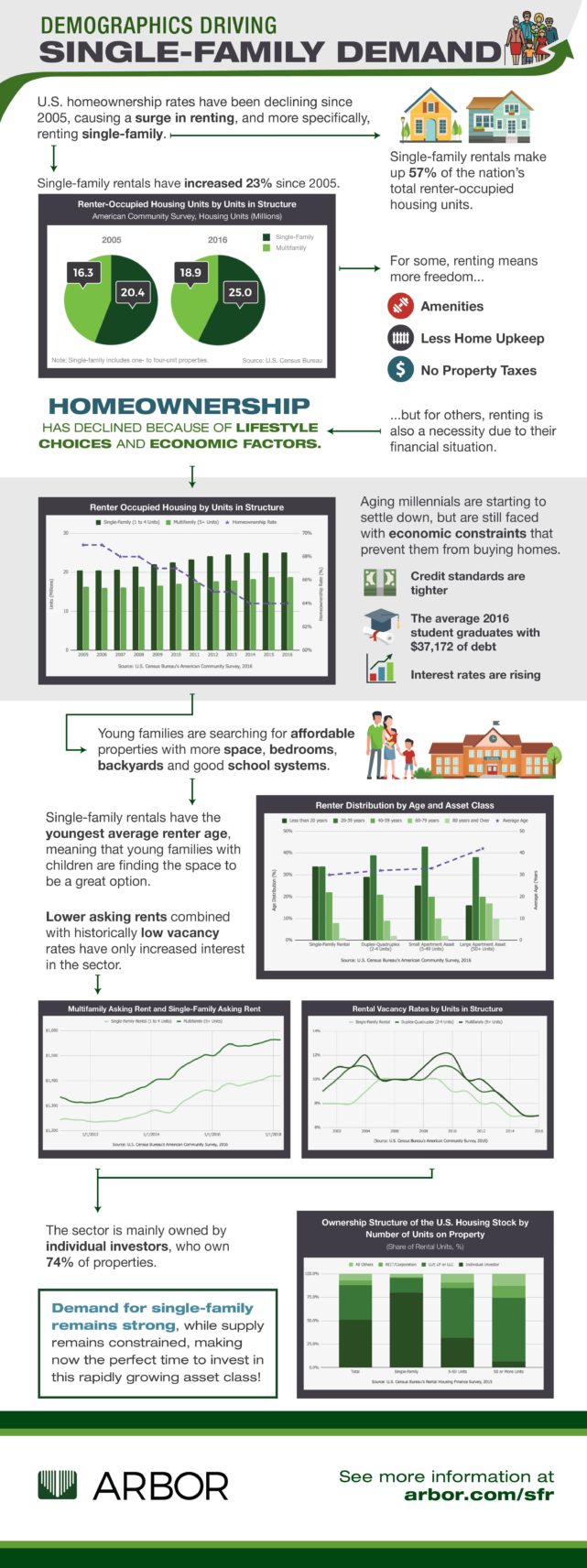Part
01
of one
Part
01
Insights on Small Single-Family Residential Rental Communities
According to residential rental analysts, REITs CEOs, and industry insiders, single-family residential rentals have been soaring in popularity over the past few years, they are more resilient than multi-family rentals during a crisis, and will continue being an attractive option for different demographics in the future.
Single-Family Rentals Are More Resilient During a Pandemic/Crisis
- In the United States, the demand for single-family residential rental homes is soaring amidst the economic downturn occasioned by the COVID-19 pandemic.
- According to executives from two REITs, stay-at-home restrictions have not reduced the demand for single-family residential homes. On the contrary, the companies are experiencing increased occupancy, with Invitation Homes' occupancy rising to 97.2% in April.
- As per Dallas Turner, president and CEO of Invitation Homes, shelter-in-place restrictions have not impacted their ability to lease homes, but "residents have been moving into the company’s properties at the same rate as last year and at a faster clip than they have been moving out."
- David Singelyn, American Homes 4 Rent chief executive officer, also noted that the demand for single-family homes had increased significantly, and the company generated a record number of showings in April.
- The demand for single-family rental homes in the United States is surging because "would-be buyers are postponing or canceling purchases during the economic downturn."
- According to Singelyn, single-family homes are also attracting people living in multi-family homes "looking for lower-density options in light of the pandemic and recommendations to maintain physical distancing."
- Rent collections in single-family rental units have remained relatively the same as the pre-COVID times, and Charles Young of Invitation Homes believes that the economic ripple effects of the pandemic could make single-family rental units even more attractive.
Single-Family Rentals Will Outpace Multifamily Rentals
- According to John Pawlowski, senior analyst of residential at Green Street Advisors, single-family rentals are projected to "outpace multifamily rentals in the next few years in terms of rent, revenue and even NOI growth."
- As per Green Street Advisors, multifamily NOI will decline by 6% in 2021.
- The attractiveness of this rental market sector has led to recent investments in the sector. One such investment is the $625 million partnership between JP Morgan Asset Management and American Homes 4 Rent to develop approximately 2,500 single-family rental homes in multiple markets in the West and Southeast.
- The demand for multifamily homes is slowing down significantly since "its fundamentals are too strongly correlated to job losses" and the shifting demographics during this pandemic.
- The growth of the single-family rental segment of the industry has been going on for a while now, outpacing both single-family for-sale homes and multifamily rentals.
- According to analysts, some of the factors driving this growth include:
- a significant number of millennials are getting married and having kids, but not all of them can afford or want to buy homes.
- boomers are moving into smaller homes since they are tired of home ownership.
- According to the National Rental Home Council, since 2006, the single-family residential rental segment has been the fastest-growing segment of the overall residential market in the US, registering a 30% growth since 2007 compared to multi-family's 15% growth for the same period.
Other Insights
Increased Investments in Single-Family Rentals in Southeast US
- While we could not find insights specific to states in the Southeast US, we established that for the companies and financial institutions investing in building single-family rentals, almost all of them start with Southeast US.
- These include American Homes 4 Rent, Davidson Holding, ERC Homebuilders, and J.P. Morgan Asset Management.
Demographic Profile of the Typical Customer
- We have provided the following data points that provide insights into the demographic profile of a typical renter of a small single-family house.
Age
- According to many sources, renters of single-family homes are mostly millennials who are starting families, albeit late, but cannot afford or just don't want to buy houses.
- Baby boomers are also getting attracted to such homes where they can have a lock and leave mentality since they are tired of home ownership.
- According to Matt Blank, a principal at BB Living, a build-to-rent company, their typical customers is, "a couple in their late 30s with two children and an annual income from $80,000 to $110,000."
- As per Robert Dietz, NAHB’s chief economist, the surge in demand for single-family rentals in the US is driven by millennials moving from their 20s to 30s.
- Most single-family home renters in the US are aged between 35 and 44.
- Jordan Kavana, the founder of Clean Living Communities (TM), a significant player in the segment, says, "that 60% of their renters are young families."
Income
- Renters of single-family houses in the United States earn between $75,000 and $100,000 annually.
Gender
- According to data from NexMetro, a rapidly-growing developer in the single-family rentals segment, one-third of their renters are professional millennials, while approximately 60% of the residents are single women.
Marital Status
- According to John Burns Real Estate, 52% of SFR renters are families.
